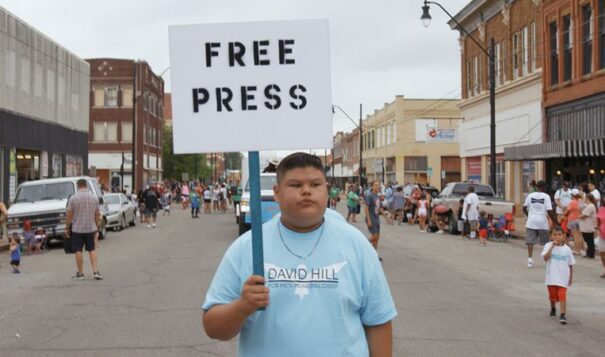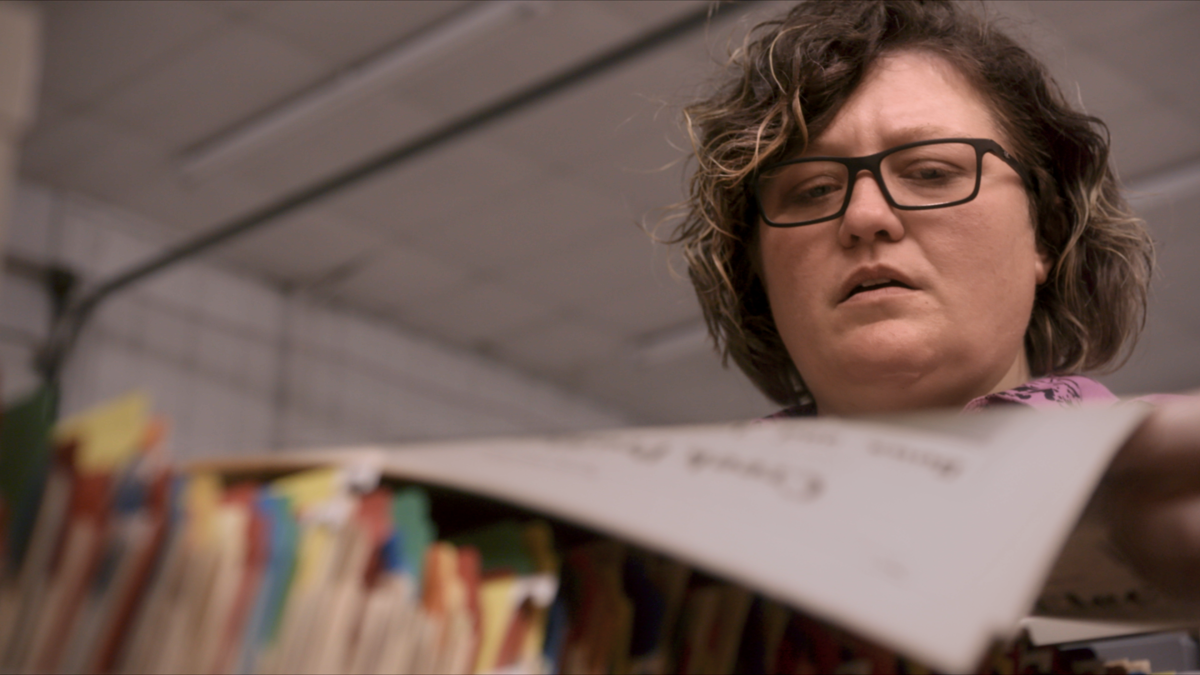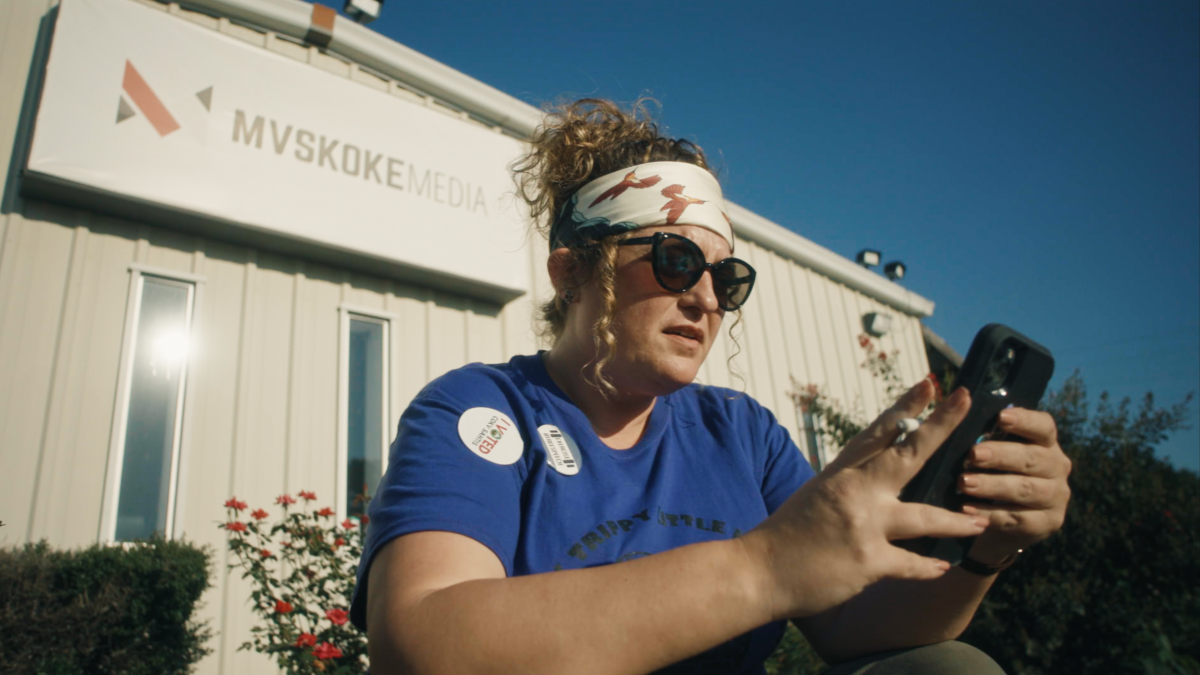News Based on facts, either observed and verified directly by the reporter, or reported and verified from knowledgeable sources.
‘Bad Press’ chronicles Muscogee journalism victory
 A young person holds a sign that reads “Free Press” while walking in a parade captured in the documentary "Bad Press." (Photo courtesy of "Bad Press")
A young person holds a sign that reads “Free Press” while walking in a parade captured in the documentary "Bad Press." (Photo courtesy of "Bad Press")
The documentary reveals the struggles of Indigenous journalists to freely cover tribal governments. The movie will screen Nov. 26 at Portland Art Museum’s Tomorrow Theater, followed by a panel discussion moderated by Underscore News
In 2018, leaders of the Muscogee (Creek) Nation in Oklahoma repealed the landmark Free Press Act. Overnight, Mvskoke Media, the news source for the fourth-largest tribal nation in the U.S., had to fight to avoid becoming government propaganda.
The documentary “Bad Press” brings viewers on a suspense-filled adventure, following a handful of dedicated Indigenous journalists over a nearly four-year sparring match with the tribal council over their demand that freedom of the press be written into tribal law. The film dives into government corruption and highlights how an independent press informs and educates tribal citizens, thus strengthening tribal sovereignty as a whole.
As a citizen of the Muscogee Nation and executive director of the Indigenous Journalists Association, Co-Director Rebecca Landsberry-Baker was personally invested in the story.
“I had seen other tribes that had just squashed their free press, and everything was swept under the rug. I didn’t want to let that happen to my tribe, to the Muscogee Creek Nation,” Landsberry-Baker said. “I can’t let this be swept under the rug like it has been so many times at other outlets.”
The film is Landsberry-Baker’s directorial debut. Joining Landsberry-Baker is Co-Director Joe Peeler, who has over a decade of documentary experience and a passion to defend free press and media.
Peeler, who is not Indigenous, said he had no idea this was happening and that’s what initially drew him into the project.
“Not only did I not know that free press was rare in Indian Country, but I did not know that even the ones who had it were being challenged,” Peeler said. “That shocked me as an outsider, and I felt like if I didn’t know that, I think a lot of other people have to know about this.”

Freedom of the press
The First Amendment states that “Congress shall make no law respecting an establishment of religion, or prohibiting the free exercise thereof; or abridging the freedom of speech, or of the press; or the right of the people peaceably to assemble, and to petition the Government for a redress of grievances.”
Freedom of the press in the United States is legally protected. However, tribal nations are sovereign nations, meaning they have the right to govern themselves how they see fit, with their own laws and constitutions. On reservations, the constitution passed by the tribal government rules, not the U.S. Constitution – and not the First Amendment.
Out of 574 federally recognized tribes in the United States, only five have passed laws protecting freedom of the press.
Tribal citizens need reliable information about their governments, just as all citizens do. And tribal governments, just like all governments, are strengthened by the transparency and accountability created by good journalism.
“If the vast majority of tribal papers don’t have press freedoms, that’s a huge problem,” Graham Lee Brewer, Cherokee, investigative reporter at NBC News and former president of the Indigenous Journalists Association, said in the film. “Especially for a community that I would argue is among the most invisible and misunderstood in the country.”

‘Tribal newspapers have that complete picture’
It was reading the community newspaper with her grandfather as a child that sparked a passion for storytelling for Angel Ellis, director of Mvskoke Media. Fast forward to adulthood, Ellis turned that obsession into a career.
“I became obsessed with journalism as a kid, really. I learned how to read with my grandpa, reading the newspaper before I ever went to school,” Ellis said.
“Bad Press” follows Ellis as she fights a corrupt system for her fellow Muscogee (Creek) citizens. Her spitfire personality, can-do attitude and unwavering journalistic integrity landed her in hot water with the tribal council after she uncovered embezzlement scandals and sexual harassment claims.
Those stories just didn’t sit right with certain elected tribal officials, who said they wanted “more positive” press coverage of the tribal government.
Tribal outlets play a crucial role in tribal communities, according to Ellis. She says tribal newspapers have a concrete understanding of how tribal communities look today, whereas mainstream media outlets have to play catch up to accurately and authentically portray Indigenous communities.
“Tribal newspapers have that complete picture for us to look into, we can see ourselves as heroes, leaders, mothers, aunts and fathers. We can see all the wonderful parts of us,” Ellis said. “And we can also see the ugly things, we can see how we work through that, and we can see how we’ve had to overcome. There’s a more holistic message, and it’s just a more Indigenous approach to journalism, that storytelling relationship we don’t ever leave, when it’s a tribal newspaper.”
Ellis says she always had the mindset of a storyteller archiving information for the future. But the more she became connected with her Muscogee (Creek) identity, she realized just how harmful journalism can be, and how important it is to do it right from the start.
“On the one hand, journalism can be hard, and it can be a grind. But when you combine it with the passion and love of telling the authentic story of your people, it can be really motivating, and it can pull you along, like a bullet train.” Ellis said. “You just got to hold on to it.”
That bullet train pulled Ellis into a multiyear fight to bring press freedom to her fellow tribal citizens.
“It’s so critically important for a tribal newspaper to have press freedom, because they’re the only ones really serving that audience completely,” Ellis said.

Screening Sunday night in Portland
One of the five tribal papers that operates under free press laws is right here in Oregon. Smoke Signals, the independent tribal newspaper of the Confederated Tribes of Grand Ronde, has operated independently from tribal council for nearly seven years.
In December 2016, the Confederated Tribe of Grand Ronde’s tribal council passed an independent press ordinance stating that Smoke Signals, as an independent tribal press, shall be free from any undue influence, and free from any particular political interest.
“It is the duty of the press to report without bias the activities of the government and the news of interest so as to have informed citizens,” the ordinance states.
On Nov. 26, Smoke Signals staff will join “Bad Press” co-director Joe Peeler and Underscore News for a screening of “Bad Press” to be held at Portland Art Museum’s Tomorrow Theater.

Immediately following the screening, Underscore staff will talk with Peeler about the process of making the film, and with Smoke Signals staff about how they cover the Grand Ronde community.
“Everywhere we show this, every journalist says, ‘This was the shot in the arm that I needed.’ I know that it can do the same thing for this country, too,” Ellis said. “I think that people will begin to see that journalism is a patriotic thing.”
That goes double for tribal citizens.
“You’re not less of a patriot because you listen to information and engage,” Ellis said. “You’re more of a patriot because you’re informed. And so I hope that it turns that tide nationally as well.”
